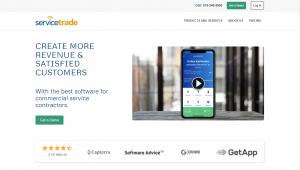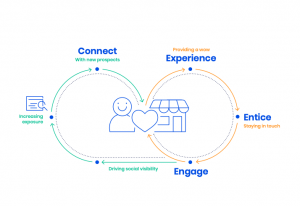— December 21, 2017

Every day, more members of the Baby Boomer generation are leaving the workforce. In fact, according to research by the Pew Research Center, by 2030 “all members of the Baby Boom generation” will have reached the retirement age of 65—with an average of 10,000 Baby Boomers reaching retirement age every day between now and then.
This is an enormous issue for many organizations that are charged with identifying and hiring replacements for their most experienced leaders. The Millennial generation, which is becoming a larger part of the workforce, is a potential source of leaders.
To develop these individuals into effective leaders, companies need to understand the Millennial generation — what motivates them, what characteristics make up their leadership styles, what kind of values they bring to the table, and what they want out of a career. Recently, a member of the OnPoint team sat down with Brittany Balog, a Millennial leader of a B2B organization, to discuss her challenges, goals, and past experiences.
Brittany Balog is the Client Services Manager and second in line at her marketing firm. She manages roughly 20 people. Brittany is 27 years old and began taking on leadership responsibilities at her current company within the first year after she graduated with her bachelor’s degree.
Through our interview with Ms. Balog, OnPoint was able to get an inside look at what drives Millennial-generation leaders, and create a few key takeaways from her example. Here are some of the questions and answers from the interview:
Q: What Are Your Challenges as a Millennial Leader?
One is gaining respect, trust, and buy-in from other leaders who are much older and more experienced than I am. A lot of our clients are managers who are twice my age. They have much more experience and some share the belief “why should I trust you when you’re just out of school?”
Another is determining how to establish the right kind of relationship with my team so that I’m respected as a manager without being seen as too much of a friend or peer. It’s hard because I’m the same age as a lot of the people reporting to me. When you have really good relationships with people, it can be more challenging to hold them accountable.
For me, personally, being able to lead as opposed to managing is very important. I’m a big believer of working as a team. However, it’s hard not to have full control of projects and accounts, and that requires building a very high level of trust with your team and employees. Being able to “let go” and let my team handle things has been difficult, but incredibly necessary and effective for our company.
Q: What’s the Preparation You Were Given to Take On Your Role?
Real-world experience. I didn’t really receive much training. I have a lot of of drive and I go the extra mile, taking the extra time to do research and constantly improve.
My college education was a good starting point, but the real-world experience was more beneficial. I owe a lot of credit to my first manager in the corporate world. He believed in me, which made it easy to be motivated. But as far as training, if I didn’t know something, I would look it up, research it, reach out and ask someone, and then implement it. There was a lot of trial and error, but I don’t think I’ve ever said “I don’t know.” I just find the best resources and answers I can and work from there. The constant learning, confidence, and motivation is where I got to be today.
Q: What Preparation Do You Wish You’d Been Given?
I wish that I had a mentor to go to and ask questions. Someone older with experience that I could learn from. I switched companies but having a mentor would have been really cool. I’m enrolling in a mentor protégé program because I still strongly believe in the importance of having a mentor.
I can learn a lot of tactics on my own and the business experience comes naturally from simply doing my job every day, but being able to network with people in other businesses and industries to grow my knowledge of the industry as a whole is very valuable. Being able to take that back to share with my team for us all to grow together helps, too.
I also wish that I was more organized. I was trying to be good at a lot of little things rather than being great at a few big things. I should have set better goals and tracked my progress. It’s something I’m still working on because it’s easy to be pulled in a lot of directions, but since learning about the EOS (Entrepreneurial Operating System), I’ve been setting quarterly goals and tracking my progress, which has been very rewarding.
Q: What is Important to You in Terms of Your Organization’s Culture?
That everyone feels fulfilled in their job role and is constantly able to keep learning—all while truly loving where they work and whom they’re working with. I also think that it’s important to have a collaborative and supportive work environment. Working with others brings the best ideas to the table.
Selfishly, I want them to believe I’m the greatest leader they’ve ever had as well!
Q: What Do You Expect from Your Boss?
Honest feedback and a clear career path so I can just continue to excel.
Working in an environment where it’s okay to fail, as long as you learn from those failures and get better. Having a boss that encourages you to try and fail rather than not trying at all is essential to me; they always need to have my back and be willing to work collaboratively.
Q: How Did You Get to Where You Are?
Passion for what I do. I really believe in our field. I think I owe a lot of it to the people around me who keep me going and have helped me. Also, I’m really motivated to be successful, it’s just a part of who I am.
Networking is also huge. I’m really proud to say every job I’ve held has been through a personal reference and referral, not my resume. That’s one of the top things in my life I’m most proud of.
I also have to shout out my parents, family and friends for this as well. Every step of the way they’ve told me the truth, believed in me, and encouraged me to follow my dreams. Their support is indispensable.
Q: What’ll It Take to Keep You Here, Happy, and Engaged?
A path for growth, a good culture, and the people—that’s a big one for me. I’m here because of the people and the ability to keep advancing my career. I’m really motivated and can’t stay in one spot for a long period of time; I have to keep advancing to feel fulfilled.
Lessons to Learn from This Millennial Leader’s Example
Although only a single example of a Millennial leader, Brittany’s responses can provide some valuable insight into the kinds of challenges Millennials face in today’s workforce.
Some of the lessons that can be gleaned from this leader’s responses are:
- Millennial Leaders Want Mentorship/Support. Mentorship programs allow employees to benefit from the knowledge and experience of their senior counterparts—helping them prepare for future responsibilities. These programs also can help them network and build a sense of connection with others at work.
- Younger Leaders May Struggle with Respect and Credibility. It may not surprise most to hear that because Millennial leaders are often younger than other leaders in the organization, it can take longer to establish trust and credibility. The more interesting takeaway is that Millennial leaders can also have difficulty earning the respect and trust of employees their own age.
- Millennial Leaders Will Proactively Seek Out Information on Their Own. Millennials grew up in the age of the search engine and instant access to knowledge. When they don’t know something, they’ll look it up on Google or some other resource to learn what they need to know. However, many online information sources can be misleading or erroneous. So, it’s vital that people are given access to a reliable repository of data—or are able to vet information they collect through on-the-job experiences and coaching.
- Collaboration is Important. Millennials are likely to put a high importance on cooperation and inclusion in the workplace culture. The leader in this case study wanted to make sure that others in her organization felt fulfilled with their work—further indicating the importance of creating an inclusive workplace culture.
- Continuous Growth is a Major Goal. Even when attempts to experiment with new processes and ways of doing things might end in failure, Millennial leaders are looking to help themselves and those around them grow. Encouraging people to “fail forward” is a trait that Millennials look for in their leader. This can help drive innovation in an organization when tempered with due caution.
Using these lessons, an organization can help guide the development of their high-performing Millennial employees and better prepare them for leadership roles. Another benefit of addressing some of the issues faced by Millennial leaders is that it can help to improve employee engagement and retention among these high-value employees. For example, by addressing the need for mentorship and support, you can simultaneously develop the Millennial’s skills and fill a need that keeps them invested in your company.
However, this is a case study of one person, and the needs of the Millennials in your own company may vary. Because of this, it may be worthwhile to conduct assessments of the attitudes of Millennial-generation leaders and employees in your own organization to learn what challenges they face and gain insight into what motivates them. This could prove valuable in your efforts to meet their needs (e.g., wanting growth, wanting guidance and being self-motivated about learning or finding things out).
If you would like more insights on how you can improve your organization’s leadership development programs, OnPoint is here to help. You can contact us directly for more information.
Business & Finance Articles on Business 2 Community
(82)







